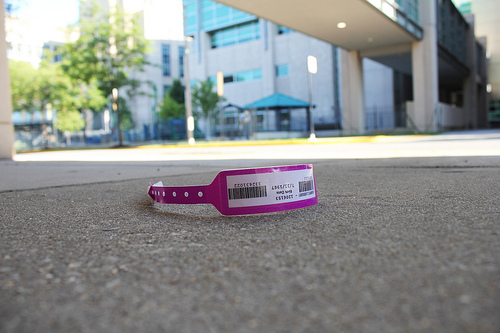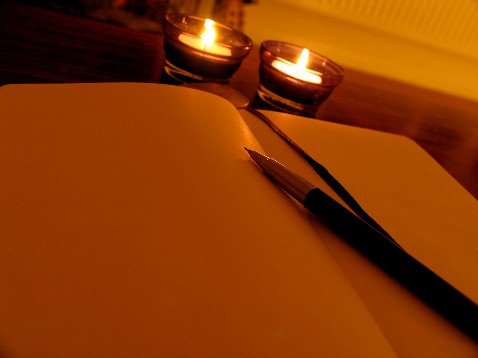headless
/ photo by sherrattsam.
photo by sherrattsam.
I have this itty bitty Buddha. It is made of some kind of soft white clay. My friend brought it back after a South Pacific tour in the Navy. His R&R involved visiting Thailand. He climbed the stairs to a Buddhist monastery one morning, he told me on his first night back. We stared at each other over bourbon and cigarettes. "The sun was coming up. I never meditated in my life," he said, "but I sat still and focused on my breath, like you said. Then I thought I could smell you there, across the world." Maybe we were a little bit in love back then, even though we strictly were not in love. That morning, he wanted to come home, he explained. Instead he bought the Buddha for me. He brought Thailand to me because I brought home to him, he said. It is three-fourths of an inch high. A wee thing. I used to put it on odd places, like the space between my television and my table, since it slide in right under the screen. Sometimes I would put it behind a book, or on my coffeepot, or in my medicine cabinet between the bandages and the hydrocortisone cream.
When he was first shipped off to Iraq, I thought that I understood impermanence. When he came back, I thought I understood karma. It wasn't until my daughter died that I realized I understood nothing.
The itty bitty Buddha is an intricate, beautiful, sacred thing to me. Full of contradictions and comforts. I protected it in the way we protect gifts from eras of our lives. A few years ago, when I had just become a parent, my one year old nephew came to visit, and bit the head off my little Buddha. I didn't watch him do it, but after he left, I found my decapitated bodhisattva knocked over, his head on the floor. And when I inspected the body, one tiny tooth marked the spot where his death writ. The boy, like a little Godzilla, snatched up the body of my guru. ROWR. He screeched in a little one year old way. Then he bit the head off, spat it on the floor, ROAR, I stomp your villag...ooo look, blocks.
Or at least, that is the scene in my head, like I said, I didn't witness it.
I keep the Buddha headless. An ironic reminder of impermanence and death and all those things I no longer need to be reminded of since my daughter died inside of me. The tooth mark is worn away, and the boy who gave it to me (he was really just a boy then too) also worn away. More people ask me about the headless Buddha now than before when it was just a miniature Buddha with its head. I wonder if a broken thing become more powerful by it brokenness.
I have been thinking of gluing the head back on the Buddha. I no longer want to make sweeping statements about the nature of impermanence, I just want everything to be whole again. I just want to be whole again.
+++
I have lain, looking into a basket, waiting for the blade to drop. They told me she was dead, and then pushed my head forward gently.
Now, wait until your head falls into the basket. You will birth her, then hold her, then give her to a stranger who will burn the body. The stranger won't wrap her in orange, nor bless her soul into another life. We won't throw dust on her and whisper, 'Ashes to ashes.' We won't set her in a kayak and set it ablaze out to sea with the other Vikings. We will take her to a sterile room, undress her. We will look for an answer and we won't find one. We will take her to a house, and they will burn her there. Her soul isn't here anymore, so you don't have to worry. We do this sort of thing all the time. She is taken delicately, cleanly away. We will baptize her head, then take yours, if you'd like.
Yes, please.
You won't notice it happening. You will be all heart. It will hurt that way--to feel and not think--but you will learn more than you can absorb with your head. Later, when you have had enough, we will glue your head back on your body. Your head may always face slightly east, or right, or just a little off-center.
I want my head to always face forward.
It is not possible. You were guillotined. You don't bounce back from such a thing. It is important to follow the protocol here of always being slightly crooked. All the cashmere turtlenecks, the expensive silken scarfs, the fox stoles--the fancy, delicate, dead things you wrap around the scar--may not make it any less noticeable. Perhaps that will make it even more so.
I think I want to keep my head.
Of course you do. You are attached to it. But it has not served you well. I can assure you that you were using it marginally at best. You won't miss it nearly as much as your daughter. Losing your head will seem rather inconsequential in the long run. Perhaps you should go headless for a while before we talk about sewing your head back on. Remember that is the true sense of impermanence--to lose a thing you didn't know you had to begin with. Now look down. This won't hurt a bit.
Does the concept of impermanence resonate with you more deeply now? Or did it always? How do you relate to others who seem attached to things that seem so impermanent? Do you feel more head or heart right now? What part of you did you lose with your child? Your head? Your heart? Your vocal cords? Your soul?





